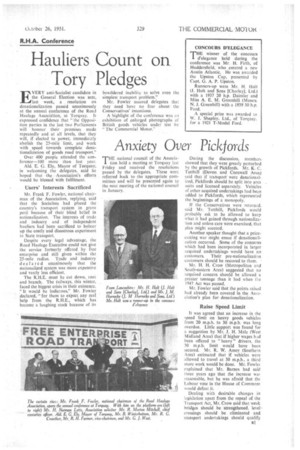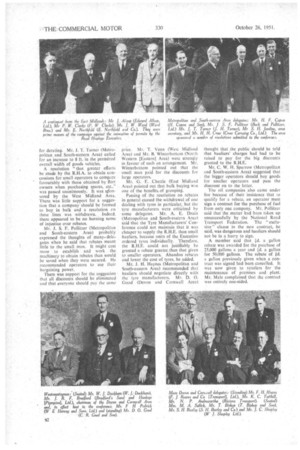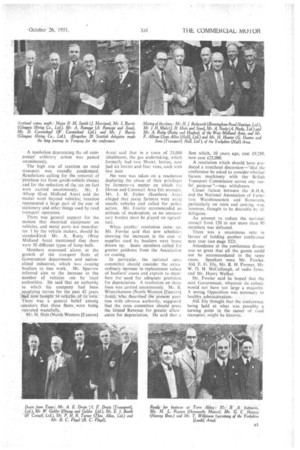Anxiety Over Pickfords THE national council of the Associa tion
Page 35

Page 36

Page 37

If you've noticed an error in this article please click here to report it so we can fix it.
held a meeting at Torquay last Friday and received the resolutions passed by the delegates. These were referred back to the appropriate committees and will be presented again to the next meeting of the national council in January. During the discussion, members showed that they were greatly perturbed by the growth of Pickfords. Mr. K. C. Tutthill (Devon and Cornwall Area) said that if transport were denationalized, Pickfords should be split into area units and licensed separately. Vehicles of other acquired undertakings had been added to Pickfords, which represented the beginnings of a monopoly.
If the Conservatives were returned, said Mr. Tutthill, Pickfords would probably ask to be allowed to keep what it had gained through nationalization and unless care were exercised, that plan might succeed.
Another speaker thought that a pricecutting war might ensue if denationalization occurred. Some of the concerns which had been incorporated in larger acquired undertakings, wciuld have no
customers. Their pre-nationalizati m customers should be restored to them. '
Mr. II H. Crow (Metropolitan and South-eaStern Area) suggested that no acquired concern should be allowed a greater tonnage than it had when t!le 1947 Act was passed, Mr. Fowler said that the points raised had already been coveied in tht ASS 3ciation's plan for denationalization.
Raise Speed Limit It was agreed that an increase in the ;peed limit on heavy goods vehicles from 20 m.p.h. to 30 m.p.h. was long overdue. Little support was found for suggeStion by Mr. J. H. Male (West Midland Area) that if higher wages had been offered to " heavy " drivers, the 30 m.p.h. limit would have been secured. Mr. R. W. Arney (Southern Area) estimated that if vehicles were allowed to travel at 30 m.p.h., a third more work would be done. Mr. Fowler explained that Mr. Barnes had said three years ago that the increase was reasonable, but he was afraid that the Labour vote in the House of Commons would defeat it.
Dealing with desirable changes in legislation apart from the repeal of the Transport Act, Mr. Crow said that weak bridges should be strengthened, level crossings should be eliminated and transport undertakings should qualify
for derating. Mr. J. T. Turner (Metropolitan and South-eastern Area) called for an increase to 8 ft. in the permitted overall width of goods vehicles.
A resolution "that greater efforts be made by the R.H.A. to •obtain concessions for small operators to compare favourably with those obtained by fleet owners when purchasing spares, etc.," was passed unanimously. It was Oonsored by the West Midland Area. There was little support for a suggestion that a company should be formed to buy in bulk and a resolution on these lines was withdrawn. Indeed, there appeared to be no burning sense of injustice over rebates.
Mr. J. S. F. Pollitzer (Metropolitan and South-eastern Area) probably expressed the thoughts of many.dele.gates when he said that rebates meant little to the small man. It might cost more to establish and work the machinery to obtain rebates than would be saved when they were secured. He recommended operators to use their bargaining power. There was support for the suggestion that all discounts should be eliminated and that everyone should pay the same
price. Mr. T. Venn (West Midland Area) and Mr. B. Winterbottom (North Western [Eastern] Area) were strongly in favour of such an arrangement. Mr. Winterbottom pointed out that the small man paid for the discounts for large operators.
Mr. G. .E. .Chettle (East Midland Area) pointed out that bulk buying was one of the benefits, of grouping.
Passing of the resolution on rebates in general caused the withdrawal of one dealing with tyres in particular, but the tyre manufacturers were criticized by some delegates. Mr. A. E. Drain (Metropolitan and South-eastern Area) said that the Tyre Manufacturers' Conference could not maintain that it was cheaper to supply the R.H.E. than small hauliers, because units of the Executive ordered tyres individually. Therefore, the R.H.E. could not justifiably be granted a rebate greater, than that given to smaller operators. Abandon rebates and tower the cost of tyres, he added.
Mr. J. H. Haynes (Metropolitan and South-eastern Area) recommended that hauliers should negotiate directly with the tyre manufacturers. Mr. D. 0. Good (Devon and Cornwall Area)
thought that the public should be told that hauliers' charges had had to be raised to pay for the big discounts granted to the R,H.E.
Mr. C. W. H. Sparrow (Metropolitan and South-eastern Area) suggested that the bigger operators should buy goods for smaller operators and pass the discount on to the latter.
The oil companies also came under fire because of their insistence that to qualify for a rebate, an operator must sign a contract for the purchase of fuel from only one company. Mr. Pollitzer said that the matter had been taken up unsnccessfully by the National Road Transport Federation. The "exclusive" clause in the new contract, he said, was dangerous and hauliers should not be in a hurry to sign.
A member said that id. a gallon rebate was awarded for the purchase of 25,000 gallons a year and :3d. a gallon for 50,000 gallons. The rebate of id. a gallon previously given when a contract was signed had been cancelled. It was now given to retailers for the maintenance of premises and plant. Mr. Male complained that the contract was entirely one-sided.
• A resolution deprecating the oil companies' arbitrary action was passed unanimously.
The high rate of taxation on Toad transport was. roundly condemned. . Resolutions calling for the removal of Pnrchase tax from goods-vehicle chassis and for the reduction of the tax on fuel were carried unanimously. Mr. J. Alison (East Midland Area) said the matter went beyond vehicles; taxation represented a large pad of the cost of stationery and other things used by road transport operators.
There was general support for the motion that electrical equipment on vehicles, and metal parts not mantsfaetur I by the vehicle makers, should be standardized. Mr. A. Rutty (West Midland Area) mentioned that there were 50 different types of lamp bulb.
Members expressed alarm at the growth of the transport fleets of Government departments and nationalized industries, which • was causing hauliers to lose work. Mr. Sparrow referred also tothe increase in the number of vehicles run by local authorities. He said 'that an authority to which his company had been .supplying lorries for the past 42 years ildsV.bought 14 vehicles of Its Own. There: Was -a general belief among speakers that these fleets-were being 'operated wastefully.
H. Holt (North Western [Eastern] Area) said that in a town of 25,000 inhabitants, the gas undertaking, whieh formerly had two 30-cwt. lorries, now had six lorries and four vans, each with two men.
No vote was taken -on a resolution deploring the abuse of their privileges by farmers—a matter on which the Devon and Cornwall Area felt strongly. Mr. J. H. Fisher (Southern Area) alleged that many farmers were using unsafe vehicles and called for police action. Mr. Fowler recommended an attitude of moderation, as no unnecesSary burden must be placed on agriculture.
When another resolution came up, Mr. Fowler said that new schedules showing the increases in the cost of supplies used by hauliers were being drawn up. Some members called for greater guidance from the Association on costing.
In particular, the national rates committee should consider the extraordinary increase in replacement values of hauliers' assets and explain to members the need for adequate provision for depreciation. A resolution on these lines was carried unanimously. Mr. B. Winterbottom (North Western [Eastern] Area); Who ' descri bed' 114' preSent position -with -obvious authority, suggested that the rates .committee should press the Inland Revenue for .greater allowances for depreciation. He said that a
fleet which, 10 years ago, cost £9,250, now cost £22,000.
A resolution which should have produced a trenchant discussion—"that the conference be asked to consider whether liaisonmachinery with the British Transport Commission serves any useful purpose "—was withdrawn.
Closer liaison between the • R.H.A. and the National Association of Furniture Warehbusemen and Removers, particularly on rates and costing, was, however, thought to be desirable by all delegates.
An attempt to reduce the national council from 120 to kit' mare than 90 members was defeated, There was a unanimous vote in favour of holding another conference next year (see page 322).
Attendance at the conference dinner was so great that all the guests could not be accommodated in the same room. Speakers were Mr. Fowler, Ald. E. G. Ely, Mr. R. H. Farmer, Mr. W. D. H. McCullough, of radio fame, and Mr. henry Walker, Mr. Fowler said he hoped that the next Government, whatever its colour, would not have too large a majority. A strong Opposition was necessary to healthy -administration... •
Aid.Ely thought that the conference, being held at -what was possibly a turningpoint in the career of road transport, might be historic.




















































































